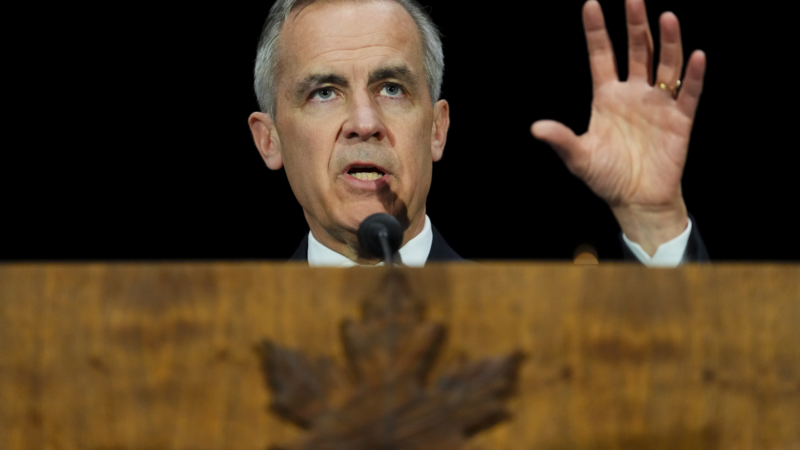Canadian Prime Minister Mark Carney and opponent kick off their election campaigns
TORONTO — New Canadian Prime Minister Mark Carney and his Conservative opponent kicked off their election campaigns Sunday against the backdrop of a trade war and annexation threats from U.S. President Trump.
Carney announced there will be a five-week election campaign before the vote on April 28.
The governing Liberals had appeared poised for a historic election defeat this year until Trump declared a trade war. Trump has repeatedly said that Canada should become the 51st U.S. state and he acknowledged Friday that he has upended Canadian politics.
Trump’s almost daily attacks on Canada’s sovereignty have infuriated Canadians and led to a surge in Canadian nationalism that has bolstered Liberal poll numbers.
“President Trump claims that Canada isn’t a real country. He wants to break us so America can own us. We will not let that happen,” Carney said.
The governing Liberals had appeared poised for a historic election defeat this year until Justin Trudeau announced his resignation in January and Trump declared a trade war. Carney has said the government in a time of crisis needs a strong and clear mandate.
“The next election will be one of the most consequential in our lifetimes,” he posted on social media overnight.
The election campaign for 343 seats or districts in the House of Commons will last 37 days. While other parties are running, the Liberals and the Conservatives are the only two that have a chance to form a government. The party that commands a majority in Parliament, either alone or with the support of another party, will form the next government and its leader will be prime minister.
Carney replaced Trudeau, who announced his resignation in January but remained in power until the Liberal Party elected a new leader on March 9 following a leadership race by the governing party.
The opposition Conservatives hoped to make the election about Trudeau, whose popularity declined as food and housing prices rose and immigration surged. But after decades of bilateral stability, the vote is now expected to focus on who is best equipped to deal with Trump.
Trump put 25% tariffs on Canada’s steel and aluminum and is threatening sweeping tariffs on all Canadian products — as well as all of America’s trading partners — on April 2.
Pierre Poilievre, the leader of the Conservatives, is Carney’s main challenger. The party and Poilievre were heading for a huge victory in Canada’s federal election this year until Trump’s near-daily trade and annexation threats derailed them.
Poilievre said he will stand up to Trump but Alberta Premier Danielle Smith, a conservative ally, said in an interview Poilievre would be “very much in sync” with the “new direction in America.”
“I will insist the president recognizes the independence and sovereignty of Canada. I will insist he stops tariffing our nation,” Poilievre said as he launched his campaign.
Poilievre said he doesn’t respect “the treatment that he has meted out to our country.”
“I know a lot of people are worried, angry and anxious. And with good reason as a result of the president’s unacceptable threats against our country,” he said.
“You are worried about your job and the sovereignty of our nation. And you are angry at the feeling of betrayal that these unacceptable words and tariffs have made us all experience. I share your anger and I share the worry about our future.”
Carney still hasn’t had a phone call with Trump and that might not happen now until after the election. Trump mocked Trudeau by calling him governor, but he has not yet mentioned Carney’s name.
Carney, 60, was the head of the Bank of Canada during the 2008 financial crisis. In 2013, he became the first noncitizen of the United Kingdom to run the Bank of England — helping to manage the impact of Brexit.
Poilievre, 45, for years the party’s go-to attack dog, is a career politician and firebrand populist who says he will put “Canada first.” He vows to defund Canada’s public broadcaster and he won’t allow media onboard his campaign buses and planes.
Rideshare union rights, social media limits and other state laws taking effect Jan. 1
Every new year, public media reporters across the country bring us some of the new state laws taking effect where they are. Here are six in 2026.
Guides to help you tackle your New Year’s resolutions
From building your strength to tackling credit card debt, NPR's Life Kit has a newsletter journey to help you tackle your New Year's resolution.
Guides to help you tackle your New Year’s resolutions
From building your strength to tackling credit card debt, NPR's Life Kit has a newsletter journey to help you tackle your New Year's resolution.
Dozens presumed dead in fire at Swiss Alps bar during New Year’s celebration
Dozens of people are presumed dead and about 100 injured, most of them seriously, following a fire at a Swiss Alps bar during a New Year's celebration, police said Thursday.
Warren Buffett officially retires as Berkshire Hathway’s CEO
The legendary 95-year-old investor spent decades building his company into one of the world's largest and most powerful. Now Greg Abel is taking it over.
Crypto soared in 2025 — and then crashed. Now what?
For most of 2025, cryptocurrencies such as bitcoin surged as President Trump vowed to make the U.S. a crypto leader. But now, a severe sell-off has shaken the sector.






